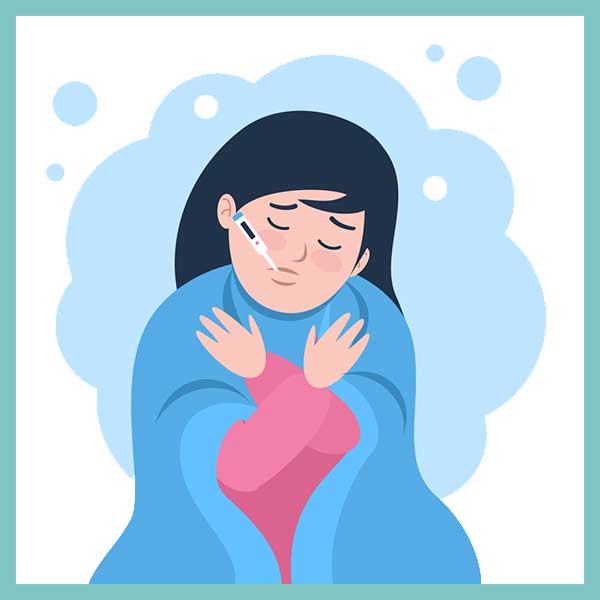Health Problems in Farsi

How to say “I do not feel well” in Farsi
No one likes to get sick while traveling, but no matter where we are, we may experience health issues. We hope you never get sick while traveling in Iran, Afghanistan, or Tajikistan, but if you face any problem, you know where to seek help for learning how to talk about your health problems in Farsi. You also know how to change your problem to an opportunity to practice Farsi for free.
The first step is to learn how to describe your problem. If you have pain in any part of your body, the easiest way to talk about it in Farsi is the following structure:
…. + am + dard mikone(h).
body part + my + does pain
For instance, if you have a headache, you can say: sar-am dard mikone(h).
As you may figure out, in this structure the verb is always in the third person because here the subject is the body part, not us. Therefore, if you need to say that your friend has a headache, you need to say sar-esh dard mikone(h). The following table explains how to use possessive pronouns in Farsi for saying someone has a headache.
| Subject | noun | possessive pronoun | verb |
| man | sar | -am | dard
mikone(h) |
| to | -et | ||
| un | eš | ||
| mâ | -emun | ||
| šomâ | etun | ||
| unâ | ešun |
Now you can practice this structure with other parts of the body such as dast, hand, or dandân, tooth.
This won’t be the only time that you encounter this structure, so you’d better learn it once and use it frequently. Another useful phrase you can construct with possessive pronouns in Farsi is when you want to say you do not feel well. How to say this? Easy, haalam xub nist, my feeling is not good. Now you can try to say “she doesn’t feel well”, or “they do not feel well” in Farsi.
Another simple, but very fruitful structure is using the verb dâram, I have. For instance, you can say man tab dâram, I have a fever, or man diyâbet dâram, I have diabetes.
Learning the Health Problems in Farsi
This page aims to help you describe different kinds of problems you may face. First, learn the related vocabulary about illnesses and symptoms. Then, go through the phrases and memorize them. If you have a special disease which your doctor should know, please find it in the following table and learn its name in Farsi. If you take special medication or you are under any treatment, try to learn how to talk about it in Farsi. In case we had forgotten to add important or high-risk allergies or diseases, please let us know by leaving comments so that we can add them.
Finally, to learn more phrases to conduct a conversation with your doctor, you can check visiting a doctor. There, you will learn Farsi phrases to talk to your doctor.
Health Problems in Farsi
Health Problems in Farsi
| English | Pronunciation | Farsi | Sound |
|---|---|---|---|
| sneeze | ‘atse(h) | عَطسه | |
| cough | sorfe(h) | سُرفه | |
| dizziness | sargije(h) | سَرگیجه | |
| nausea | hâlat-e tahavvo’ | حالَتِ تَهَوُّع | |
| diarrhea | ešâl | اِسهال | |
| constipation | yobusat | یُبوسَت | |
| vomit | estefrâq | اِستِفراغ | |
| shortness of breath | tangi-ye nafas | تَنگیِ نَفَس | |
| bloated | nafx | نَفخ | |
| acne | juš | جوش | |
| rash | kahir | کَهیر | |
| being itchy | xâreš | خارِش | |
| irritation | suzeš | سوزِش | |
| eye irritation | suzeš-e češm | سوزِشِ چِشم | |
| appetite | eštehâ | اِشتِها | |
| lack of appetite | bi eštehâyi | بی اِشتِهایی | |
| swollen | bâd karde(h)/ varam karde(h) | باد کَرده/ وَرَم کَرده | |
| numb | bi hes | بی حِس | |
| cardiac problem | moškel-e qalbi | مُشکِلِ قَلبی | |
| skin problem | moškel-e pusti | مُشکِلِ پوستی | |
| digestive system problem | moškel-e govâreši | مُشکِلِ گُوارِشی | |
| cancer | saratân | سَرَطان | |
| fatty liver | kabed-e čarb | کَبِدِ چَرب | |
| high blood pressure | fešâre- xun-e bâlâ | فِشارِ خونِ بالا | |
| low blood pressure | fešâre- xun-e pâyin | فِشارِ خونِ پایین | |
| hair loss | rizeš-e mu | ریزِشِ مو | |
| bite | gazidegi | گَزیدِگی | |
| seasonal allergy | hassâsiyat-e fasli | حَسّاسیَتِ فَصلی |
Talking About Diseases in Farsi
Talking About Diseases in Farsi
| English | Pronunciation | Farsi | Sound |
|---|---|---|---|
| I caught cold | sarmâ xordam | سَرما خُوردَم | |
| I cough a lot | xeyli sorfe(h) mikonam | خِیلی سُرفه می کُنَم | |
| I feel shortness of breath | tangi-ye nafas dâram | تَنگیِ نَفَس دارَم | |
| I have stomachache | delam dard mikone(h) | دِلَم دَرد می کُنه | |
| my eyes burn | češâm misuze(h) | چِشام می سوزه | |
| my ears are itchy | gušam mixâre(h) | گوشَم می خاره | |
| I am allergic to almond |
man be bâdâm hasâsiyat dâram |
مَن به بادام حَسّاسیَت دارَم |
|
| I feel nauseous | hâlat tahavvo’ dâram | حالَتِ تَهَوُّع دارَم | |
| I have puked three times from morning |
az sobh se(h) bâr bâlâ âvordam |
اَز صُبح سه بار بالا آوُردَم |
|
| I ate spoiled food | qazây-e fâsed xordam | غَذایِ فاسِد خُوردَم | |
| I feel bloated | nafx dâram | نَفخ دارَم | |
| I lost my appetite | bi eštehâ hastam | بی اِشتِها هَستَم | |
| I have skin rash | pustam kahir zade(h) | پوستَم کَهیر زَده | |
| I have acne on my face |
suratam juš zade(h) | صورَتَم جوش زَده | |
| I have hair loss | muhâm mirize(h) | موهام می ریزه | |
| my hand is swollen | dastam bâd karde(h) dastam varam karde(h) |
دَستَم باد کَرده دَستَم وَرَم کَرده |
|
| my feet are numb | pâhâm bihes hastan | پاهام بی حِس هَستَند | |
| my neck is tense | gardanam gerefte(h) | گَردَنَم گِرِفته | |
| my muscles are tense | ‘azolâtam gerefte(h) | عَضُلاتَم گِرِفته | |
| something bit my foot | ye(h) čizi pâm ro gazide(h) | یه چیزی پام رو گَزیده | |
| I have high blood pressure | fešâr-e xunam bâlâst | فِشارِ خونَم بالاست | |
| I have had a heart attack before |
qablan sekte(h)-ye qalbi kardam |
قَبلاً سِکته یِ قَلبی کَردَم |
|
| I feel down | delam gerefte(h) | دِلَم گِرِفته | |
| I feel lonely | ehsâs-e tanhâyi mikonam | اِحساسِ تَنهایی می کُنَم | |
| I am depressed | ehsâs-e afsordegi mikonam |
اِحساسِ اَفسُردِگی می کُنم |
|
| I feel hopeless | ehsâs-e nâomidi mikonam | اِحساسِ نااُمیدی می کُنَم |
|
| I feel homesick | delam barâye kešvaram tang šode(h) |
دِلَم بَرایِ کِشوَرَم تَنگ شُده |
Why to learn Farsi ..? To help you learn Farsi, our experienced Online Farsi tutors in FarsiMonde provide you with the best online Farsi classes and offer you the best Farsi learning methods.


Leave A Comment